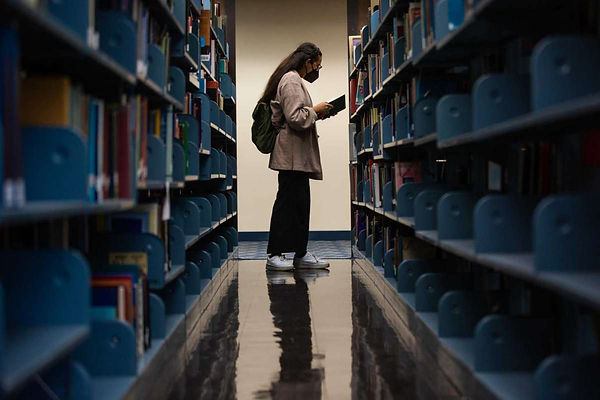
My Reporting
My Reporting
My Reporting
Do not use if
a person of color
alone in public
disabled
mislabeled
in parking garage / other dark space
of low income
plus size
queer
near beer
trans &/or other gender expression
suffer from mental illness - ie depression
showing skin
Using under above conditions could result in
serious sometimes fatal conditions such as
derogatory descriptions
heightened lack of legitimacy
heightened lack of representation
heightened lack of opportunity
generalized harassment
irregular levels of oppression
increased risk of abuse
persecution - may result in execution
use - as object, as story, as statistic > its sadistic
Usage instructions
take twice daily
or as needed - If you pleaded
with supervision
choking hazard
Unstable DACA, an Obstacle for Undocumented College Students

University of Houston Freshman, Katia Elisea Escobar, 18, Poses for Photo at UH’s Anderson Library. (Houston Chronicle/ Marie D. De Jesús,)
By August Barham
Nov. 01, 2021
With Deferred Action for Childhood Arrivals in a constant state of limbo, undocumented college students face a host of obstacles on their path toward earning their degree.
Liney Figueroa, 21 and a fourth-year at Alma College in Michigan, and Katia Elisea Escobar, 18 and a first-year at The University of Houston, are completing their Bachelors of Science and planning for their futures. Those futures depend on the ever-shifting status of the DACA program. The program supports undocumented people brought to the United States as children—often referred to as “Dreamers”—by protecting against deportation and providing access to a driver’s license, social security number and work permit. Since its inception in 2012, the program has been hotly contested in the political arena.
“We’re just really tired of having politicians play with our lives and toss it back and forth, ‘should we keep DACA or should we not keep DACA,’” Escobar said. “We can’t keep living like that. We’re human beings and we shouldn’t keep having our lives tossed around.”
Manny Guisa, the Development Coordinator for the Immigrant Legal Resource Center, said that following the most recent decision in the ongoing court battle over DACA— the Hanen ruling—no new applications will be accepted, and the program is in a “holding pattern.”
“Only renewals are able to continue following long court battles that began with the Trump administration rescinding the program in 2017,” Guisa said. “It is not clear if the program will be able to start up again in full in the future.”
Escobar’s was among over 80,000 pending applications canceled by Judge Andrew Hanen’s July 16 ruling. She remembers the moment she heard the news.
“You know when you’re on a rollercoaster and you’re at the very tippy-top and you’re about to drop,” Escobar said. “It felt like that.”
Escobar is studying biology at UH on a full-ride scholarship from TheDream.US. Figueroa is majoring in psychology and biology. As undocumented students, the two face constantly evolving obstacles on their ways to earning their degrees.
Paying for College
Guisa said that paying for college is the largest barrier for undocumented students because they can’t access federal funding, regardless of DACA status. Funding their own education is also often not an option, as they don’t have legal work authorization.
“I wanted to work during university so that I could afford to live in Houston while I studied because I wouldn’t be living with my parents anymore,” Escobar said. “It was really tough when I saw that my application wasn’t going to be processed.”
As an undocumented immigrant, Escobar is unable to work to cover her living expenses—not covered by her scholarship. DACA would provide Escobar with temporary, renewable work authorization.
Employment
Guisa said that employment authorization limits are also a barrier for undocumented college students seeking “career-fueling opportunities.”
DACA work authorization would allow Escobar to work as a medical scribe or a phlebotomist to prepare for medical school, as she wishes to. While Figueroa has this authorization, she said the program’s instability makes her plans for post-grad employment uncertain.
“I feel like, there's a little part of me that I have to tell them (possible employers), ‘Hey, I'm actually undocumented and I'm on DACA so there may be a time, if I do get accepted to your position, that I may not be able to work for you anymore because all of my rights will be taken away,’” Figueroa said.
Political Action and DACA Legislation
The proposed Biden reconciliation bill, announced on Oct. 28, could help address concerns for undocumented college students without access to DACA by expanding access to federal Pell grants for “Dreamers.” The bill is currently awaiting a House vote.
“The way my life would drastically change if that was passed speaks volumes about just how much of an impact that this decision has,” Escobar said. “I really hope they choose to do the right thing because the lives of millions depend on it.”
While Escobar, Figueroa and other undocumented students use signs and megaphones to make their voices heard, they also ask for legal citizens to amplify “Dreamer’s” voices through the ballots.
“For us DACA recipients, it's so important for our friends who are citizens to vote,” Figueroa said. “Seeing all of these citizens who aren't voting, you are our voice because we don't have a voice when it comes to voting.”
Escobar continues to hope that undocumented colleges students like herself and Figueroa will be able to access rights and privileges that will support them on their path to and past graduation.
“It is just really sad knowing that just because I don’t have a social security number—I don’t have just that one number—my quality of life, my security, my safety and just my ability to live as a human being is revoked from me,” Escobar said.